tl;dr
LocalDate.of( 2015 , 12 , 30 )
.get (
IsoFields.WEEK_OF_WEEK_BASED_YEAR
)
53
…or…
org.threeten.extra.YearWeek.from (
LocalDate.of( 2015 , 12 , 30 )
)
2015-W53
java.time
Support for the ISO 8601 week is now built into Java 8 and later, in the java.time framework. Avoid the old and notoriously troublesome java.util.Date/.Calendar classes as they have been supplanted by java.time.
These new java.time classes include LocalDate for date-only value without time-of-day or time zone. Note that you must specify a time zone to determine ‘today’ as the date is not simultaneously the same around the world.
ZoneId zoneId = ZoneId.of ( "America/Montreal" );
ZonedDateTime now = ZonedDateTime.now ( zoneId );
Or specify the year, month, and day-of-month as suggested in the Question.
LocalDate localDate = LocalDate.of( year , month , dayOfMonth );
The IsoFields class provides info according to the ISO 8601 standard including the week-of-year for a week-based year.
int calendarYear = now.getYear();
int weekNumber = now.get ( IsoFields.WEEK_OF_WEEK_BASED_YEAR );
int weekYear = now.get ( IsoFields.WEEK_BASED_YEAR );
Near the beginning/ending of a year, the week-based-year may be ±1 different than the calendar-year. For example, notice the difference between the Gregorian and ISO 8601 calendars for the end of 2015: Weeks 52 & 1 become 52 & 53.


ThreeTen-Extra — YearWeek
The YearWeek class represents both the ISO 8601 week-based year number and the week number together as a single object. This class is found in the ThreeTen-Extra project. The project adds functionality to the java.time classes built into Java.
ZoneId zoneId = ZoneId.of ( "America/Montreal" );
YearWeek yw = YearWeek.now( zoneId ) ;
Generate a YearWeek from a date.
YearWeek yw = YearWeek.from (
LocalDate.of( 2015 , 12 , 30 )
)
This class can generate and parse strings in standard ISO 8601 format.
String output = yw.toString() ;
2015-W53
YearWeek yw = YearWeek.parse( "2015-W53" ) ;
You can extract the week number or the week-based-year number.
int weekNumber = yw.getWeek() ;
int weekBasedYearNumber = yw.getYear() ;
You can generate a particular date (LocalDate) by specifying a desired day-of-week to be found within that week. To specify the day-of-week, use the DayOfWeek enum built into Java 8 and later.
LocalDate ld = yw.atDay( DayOfWeek.WEDNESDAY ) ;
About java.time
The java.time framework is built into Java 8 and later. These classes supplant the troublesome old legacy date-time classes such as java.util.Date, Calendar, & SimpleDateFormat.
To learn more, see the Oracle Tutorial. And search Stack Overflow for many examples and explanations. Specification is JSR 310.
The Joda-Time project, now in maintenance mode, advises migration to the java.time classes.
You may exchange java.time objects directly with your database. Use a JDBC driver compliant with JDBC 4.2 or later. No need for strings, no need for java.sql.* classes.
Where to obtain the java.time classes?
The ThreeTen-Extra project extends java.time with additional classes. This project is a proving ground for possible future additions to java.time. You may find some useful classes here such as Interval, YearWeek, YearQuarter, and more.

